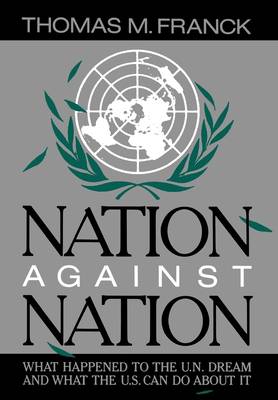
- Retrait gratuit dans votre magasin Club
- 7.000.000 titres dans notre catalogue
- Payer en toute sécurité
- Toujours un magasin près de chez vous
- Retrait gratuit dans votre magasin Club
- 7.000.0000 titres dans notre catalogue
- Payer en toute sécurité
- Toujours un magasin près de chez vous
Nation Against Nation
What Happened to the U.N. Dream and What the U.S. Can Do about It
Thomas M Franck
Livre relié | Anglais
76,45 €
+ 152 points
Description
The American public has become increasingly disenchanted with the United Nations. Some responsible sources in this country are already advocating withdrawal from U.N. agencies and perhaps even from the entire system.
This book, by the former Director of Research at UNITAR, the U.N.'s "think tank," examines the record of the U.N. during its first 40 years in the clear light of American national interest. Franck offers a balance sheet which confirms that the U.N. during its first 40 years in the clear light of American national interest. Franck offers a balance sheet which confirms that the U.N. often operates in a way that undermines respect for individual human rights and hampers conflict resolution. At the same time, he does not shrink from showing that the fault frequently lies with the United States itself. He shows how the U.S. helped form the U.N. with unrealistic views of what it could do, how for a decade or more the U.S. was able to use the U.N. essentially as a tool and adjunct to its foreign policy, and how Washington failed to predict and plan for the inevitable shift in power at the U.N. led by the newly emergent Third World nations. Franck warns of the American penchant for treating international relations as a series of unrelated encounters instead of an ongoing, institutionalized system in which the tactics and outcome of one crisis inevitably affect the way the next context is played out.
Taday the U.S. and its allies are often the butt of antagonisms that the U.N. system seems to encourage and exaggerate. Nevertheless Franck shows that even now the U.S. position in the U.N. is far from hopeless, and he provides a blueprint for a strategy of "playing hard ball," which is far more realistic than abandoning the world organization.
This book, by the former Director of Research at UNITAR, the U.N.'s "think tank," examines the record of the U.N. during its first 40 years in the clear light of American national interest. Franck offers a balance sheet which confirms that the U.N. during its first 40 years in the clear light of American national interest. Franck offers a balance sheet which confirms that the U.N. often operates in a way that undermines respect for individual human rights and hampers conflict resolution. At the same time, he does not shrink from showing that the fault frequently lies with the United States itself. He shows how the U.S. helped form the U.N. with unrealistic views of what it could do, how for a decade or more the U.S. was able to use the U.N. essentially as a tool and adjunct to its foreign policy, and how Washington failed to predict and plan for the inevitable shift in power at the U.N. led by the newly emergent Third World nations. Franck warns of the American penchant for treating international relations as a series of unrelated encounters instead of an ongoing, institutionalized system in which the tactics and outcome of one crisis inevitably affect the way the next context is played out.
Taday the U.S. and its allies are often the butt of antagonisms that the U.N. system seems to encourage and exaggerate. Nevertheless Franck shows that even now the U.S. position in the U.N. is far from hopeless, and he provides a blueprint for a strategy of "playing hard ball," which is far more realistic than abandoning the world organization.
Spécifications
Parties prenantes
- Auteur(s) :
- Editeur:
Contenu
- Nombre de pages :
- 352
- Langue:
- Anglais
Caractéristiques
- EAN:
- 9780195035872
- Date de parution :
- 11-04-85
- Format:
- Livre relié
- Format numérique:
- Genaaid
- Dimensions :
- 152 mm x 229 mm
- Poids :
- 662 g

Les avis
Nous publions uniquement les avis qui respectent les conditions requises. Consultez nos conditions pour les avis.






